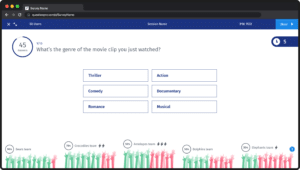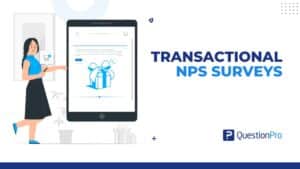
Surveys are a type of quantitative market research. Surveys for communication research use different questions to collect data supporting the research questions or hypotheses. Survey questions come in two varieties:
- Structured questions
- Unstructured questions.
Structural survey questions usually give more accurate results because the respondent only needs to use lower-level thinking to answer.
Also, researchers find it easier to code and analyze structural questions. Single-answer, multiple-answer, scaled, and ranking questions are structural questions.
Quantitative research uses structured questions and can sort the answers so that people who answer one way are sent to a different question. Structured survey questions are common in online surveys and take less time and effort to answer.
In this blog, we will discuss what structured question is and their use of it in market research plan.
What is a structured question?
A structured question is a closed-ended inquiry employed in surveys to elicit quick and accurate responses while minimizing participant thought.
These questions will lessen the researcher’s job candidates because the solutions are straightforward and easy to analyze. A thorough survey can still be conducted with much information that can be revealed quickly when several structured questions are combined.
Structured questions offer the following two main benefits:
- More accurate data and a higher response rate are typically the results. They demand less of the respondent’s mental capacity. They lessen the amount of thought that a response needs to do to do the assignment.
- As a result, coding and analysis are simpler for the researcher. This is of utmost importance, mainly if you run a research business by yourself.
Structured questions come in a variety of forms, such as:
- Nominal or ordinal categories in a single response (e.g., From the following list, please select the category that includes your visited places)
- Multiple replies (e.g., From the following list of side dish menus, please choose any or all that you regularly prefer)
- Scaled questions (for example, From “Strongly Agree” to “Strongly Disagree,” rate how well the manager is performing the duties of his role.), and
- There are numerous variants of these basic types.
Types of structured question
Structured questions are questions that have a specific format and often require a focused, concise response. They are commonly used in surveys, assessments, interviews, and research studies to gather specific information. Here are several types of structured questions:
01. Multiple Choice Questions (MCQs):
These questions present respondents with a list of options, and they must choose the correct or most appropriate answer. MCQs are commonly used to assess knowledge or preferences.
02. True/False Questions:
In these questions, participants indicate whether a statement is true or false. They are straightforward and are often used to gauge understanding of basic concepts.
03. Likert Scale Questions:
Likert scale questions measure participants’ opinions or attitudes by asking them to rate their level of agreement or disagreement with a series of statements. The scale typically ranges from “Strongly Disagree” to “Strongly Agree.”
04. Ranking Questions:
Respondents are asked to rank a set of items based on a specific criterion. This type of question helps determine preferences or priorities.
05. Scale Questions:
Similar to Likert scale questions, scale questions ask participants to rate their opinions or feelings on a numerical scale. However, the scale might not follow the traditional Likert format.
06. Dichotomous Questions:
These questions have only two possible answers, often “yes” or “no,” making them simple to answer.
07. Matrix Questions:
A table or grid of connected questions with the same set of response choices is presented as a matrix question. This approach is effective when using the same questions and response options repeatedly.
08. Closed-ended Questions:
These questions have predefined response options and do not allow for open-ended answers. They are easy to analyze but might limit the depth of response.
09. Open-ended Questions:
Unlike closed-ended questions, open-ended questions allow participants to provide detailed, unrestricted answers. These questions are useful for gathering qualitative research insights and opinions.
10. Demographic Questions:
These questions gather information about respondents’ personal characteristics, such as age, gender, ethnicity, education level, and occupation. They are often used for categorization and segmentation.
11. Binary Questions:
Binary questions are yes-or-no questions that offer a straightforward choice. They are useful for quickly categorizing participants or situations.
12. Frequency Questions:
These questions inquire about how often a certain behavior or event occurs. Responses might be in terms of daily, weekly, monthly, etc.
13. Semantic Differential Scale Questions:
These questions ask participants to rate a concept or object on a set of bipolar adjectives, such as “hot-cold,” “happy-sad,” or “fast-slow.”
14. Conjoint Analysis Questions:
These questions are used in market research to understand how people value different product or service attributes. Participants evaluate various combinations of attributes and choose their preferred options.
LEARN ABOUT: Structured Questionnaire
How to do market research using structured question
When several structured questions are combined, they can quickly provide information while still allowing for a thorough survey. To ensure a fair and comprehensive selection process, the hiring team decided to conduct structured interviews with standardized questions for all candidates.
There are numerous variations on the structured question, but some are more prevalent than others. The participant is asked to choose a range in a single response using ordinal categories, a structured question.
For example, “Please select the group corresponding to your yearly spending.”
For respondents to express their opinions easily, scaled questions are often used with responses like “agree” and “disagree” or a simple numerical scale. When the researcher needs a range of reactions, such as asking, “Which of these countries have you visited?” Multiple-choice questions are another common kind of structured question.
Additionally, structured interview questions can be used with open-ended questions to elicit more information from participants and develop contingency questions (one response leads to a new, specific question).
For example, a structured question could be, “Have you ever owned an IOS phone?” The researcher can then ask them unstructured interview questions to learn more about their ideas if they respond “yes.”
Conclusion
This blog has described the structured question and its use in market research, including examples. Structured interviews can be used in many types of research, including marketing research. Questions can differ depending on what the survey or research needs to find out.
So depending on the need, structured questions can be chosen.
Here at QuestionPro, we provide access to a library of long-term research insights and tools for data collection, such as our survey software. For a demonstration or additional information, visit InsightHub.







